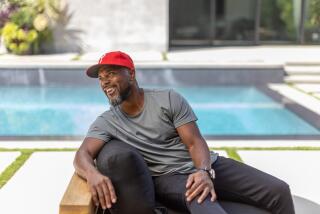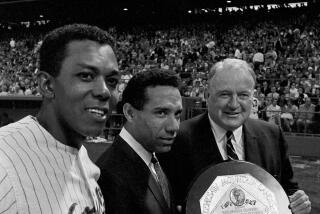ROUGH ON THE ROOKIE : Jefferies Says High Expectations Have Hurt Him
- Share via
NEW YORK — In a way, New York Mets infielder Gregg Jefferies concedes that he brought it on himself. He means those times he calls “just a living hell” of trying to live up to expectations.
“Self-inflicted pressure,” he calls it, because ballplayers are taught to think of the very natural fear of failure as something they can will out of their minds. When they struggle and aren’t able to make corrections for the first time in their lives, it’s a terrible blow.
There were times, he said, when he didn’t want to come to bat with the game on the line. There were times when Jefferies wanted to be alone and had no problem finding privacy to dwell on the game, and those times when he wished he didn’t have to brood alone. The manager could put Jefferies in the lineup, but he couldn’t make him one of the boys.
There is no textbook, no doctoral thesis on how an extremely talented rookie should be brought into the media spotlight of baseball when he is expected to be a force on a defending division champion.
When those guidelines are written, Jefferies should be the case study on how it shouldn’t be done. The process was handled poorly by the front office, the manager, the player and the teammates.
Jefferies ought to be held least responsible because he is only 21. The others ought to know better.
Now the Mets have shouldered themselves back into the division race and Jefferies is the second baseman again after more than two weeks of Keith Miller and Tim Teufel. Davey Johnson explained that Jefferies had “quality at-bats” against the crafty slants of Bruce Hurst on Thursday. Jefferies, the manager said, “reminded me of the way he swung the bat last year.”
Of course, Johnson was looking for any rationale to get Jefferies into the lineup. Johnson thinks there is no way he can get from Miller or Teufel what he thinks Jefferies can give him. Maybe Jefferies doesn’t turn the double play well, but his 29 games last season were a skyrocket.
“I was a kid who hadn’t proved anything and I was compared to Pete Rose and Mickey Mantle,” Jefferies said, 120 games into the learning experience. “I tried to close my eyes and my ears, but it’s there. It’s not like whether I believe it or not, you can’t close the door to all of it. People are saying it; it’s on you.”
He hit .321 from Aug. 28 on. He hit .333 in the playoffs. He hit Orel Hershiser, for goodness sakes. He was a switch hitter with power from both sides.
He was such a beauty they traded Wally Backman. They made room for Gregg Jefferies to become Rookie of the Year. That month turned out to be a curse in disguise. He batted second on Opening Day; he did not have the luxury of batting in the privacy of eighth or ninth. He was such a public beauty that teammates became severely afflicted by Venus envy.
“This is the least compassionate team I’ve ever seen,” one veteran noted of Jefferies’ hard times. He wasn’t hitting and the team wasn’t winning and Jefferies linked them as cause and effect. That rankled some of his elders, some of whom overlooked the fact that Darryl Strawberry had been portrayed in the same rosy light and struggled at first.
Some veterans noted that Jefferies made it difficult for others to include him. One time in mid-July he sat polishing his bat until the traveling equipment was packed and the weapon had to be cushioned among the uniforms. Strawberry plucked the bat out of its repose and flung it across the clubhouse. When others wanted batting help, they went to Bill Robinson; Jefferies phoned his father. When the manager benched Jefferies for a game or two, Jefferies pouted. So Johnson was reluctant to bench Jefferies, fearful of destroying the youngster’s usefulness. Teufel was expected to take it like a man.
History says that even Mantle was sent back to the minors in his first season; Jefferies said he would see himself as a failure. And he was kept.
Johnson says now that twice he was prepared to send Jefferies to Tidewater to restore his confidence. Once Miller was hurt and once Keith Hernandez was hurt, so it never happened. The result was that Jefferies was seen as teacher’s pet.
“I’m not the one who wanted it,” Jefferies said. “That’s the bad thing, that’s what’s going to stick in these guys’ minds most. I don’t want that to happen. That’s what was said. That’s what really bothers me; it’s so totally opposite of anything I said or did.”
One time Lee Mazzilli, who once had lived through misguided pressures for stardom, assembled the players and spoke out for Jefferies. “It was nice to know he backed me,” Jefferies said. Gary Carter and Hernandez counseled the rookie.
Not only does Jefferies not drink, he does not mix well. “A few times I felt the door was kind of shut,” he said of his teammates. If he had been hitting .320, whatever social graces the group dynamic requires and Jefferies lacked probably would have been overlooked. “Hitting does bring friends,” he said.
It tried him sorely. He says that blaming his hitting problems on the trials of learning second base would be an excuse. Some players can separate hitting from fielding. Some cannot. Jefferies wasn’t helping in either way.
“I never said I was the best player on the team,” Jefferies said. “That wasn’t the way I was brought up. I learned from my father and my grandfather that it’s a teao. But I thought, ‘If I don’t do this or that, we’re lost.’
“I can’t explain it. It was bad, really bad. It was a situation I want to forget. If I ever become a good player, I’ll want to take a rookie to one side and explain it. I wasn’t asking for sympathy. I don’t really like that.”
When July turned into August and Jefferies’ brief flurry faded, Johnson tried his version of tough love. He recalled Miller, slipped him in at second base and sat Jefferies down. “That was the thing to do,” Jefferies reflected Thursday.
But when the manager used Jefferies as a late-inning replacement for sore-armed Howard Johnson at third base, Jefferies grumbled. And Johnson shut the office door one night in Philadelphia and gave Jefferies a reading out.
And the next game Jefferies started at third base.
Now Jefferies shrugs off what amounts to a second chance to have a month like he had last year. He had two hits off Hurst. “If I play, I play,” Jefferies said. “If I don’t, I’ll do my work -- run and lift my weights. They see that. I’ve grown up a lot from the beginning of the year.”
It is a manly pose. His growth is subject to interpretation. He had that month and .226 is no encore at all. He may grow into a great player; he isn’t going to be Rookie of the Year. He could save the season -- both his and theirs.
More to Read
Go beyond the scoreboard
Get the latest on L.A.'s teams in the daily Sports Report newsletter.
You may occasionally receive promotional content from the Los Angeles Times.










